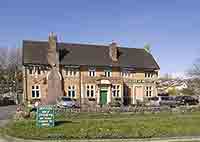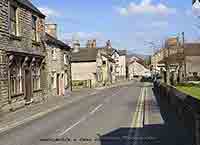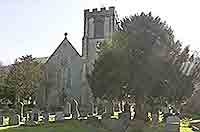Bradwell village is situated in north Derbyshire and the Peak District National Park, 2 miles from Hope, sheltering under the escarpment of Bradwell Edge and moors.
Though once heavily dependant on lead mining and smelting it has prospered through a variety of industries. The village was once famed for it's 'Bradder Beavers', hard hats initially intended for miners but later made for more general use. Bradwell, or Bradder also had a cottage industry producing optical instruments, telescopes, opera glasses and spectacles. Today, local people still work at the quarry which extracts fluorspar on Bradwell moor and the Hope cement works.

Bradwell pub |

Bradwell |

Bradwell Church |
Bagshawe cavern to the south of the village takes it's name from William Bagshawe of Wormhill, who owned the land. It is a series of caves, discovered around 1800 and reached by descending a flight of 98 steps through an old lead mine and has some supurb dripstone formations including Dog Tooth stalagmites which curl up out of the floors. It is open to the public but as a tourist attraction it has always been overshadowed by the competition from Castleton.
Hazelbadge Hall still bears the coat of arms of the Vernon family above upper mullioned windows. The house dates from 1549 and was part of the Dorothy Vernon dowry to her new husband John Manners.
One of Bradder's most famous inhabitants was Samuel Fox who invented the folding umbrella and who was also founder of the Stocksbridge steelworks. He was also a benefactor of the village, providing money towards the building of the village church, St Barnabas, and money for the poor people of the village.
The New Bell Hotel was built in 1898 and has had several names including the Thatchers and the Wellcare Inn. Tucked away in nearby Smalldale is another former old coaching inn called the Bowling Green.
Bradwell retains the old Derbyshire custom of Well Dressing, which is normally carried in early August.